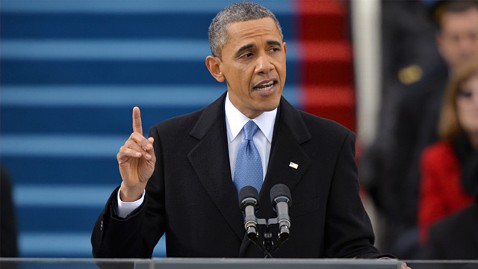A presidential campaign that was largely about jobs and the economy gave way during Monday's inaugural ceremonies to a sweeping affirmation of progressivism and call for "collective action."
Now, liberal allies of President Obama say they're closely watching to see whether the second-term president follows through on issues with which he has struggled before.
Obama's groundbreaking references to climate change and gay rights in his second inaugural address particularly surprised many progressive interest groups, which said their first-term frustrations have been replaced by a new sense of optimism.
"We are hopeful that the president's progressive speech signals a major strategy shift for the Obama administration," said Adam Green, co-founder of the Progressive Change Campaign Committee.
Green's group and other liberal Democrats have openly expressed disappointment in Obama since 2009, saying his agenda has fallen short. Many have cited his failure to advance an assault-weapons ban, as promised, enact climate change legislation or overhaul the nation's immigration system.
J. Scott Applewhite/AP Photo
The Inaugural Fashion of Michelle, Sasha and Malia Obama Watch Video
Jason Wu Inaugural Ball Gown: Michelle Obama Stunning Watch Video
Inauguration 2013: Obama's Speech a Call to Action Watch Video
Get more pure politics at ABCNews.com/Politics.
Other progressives have chafed at Obama's extension of the Bush-era tax cuts for the wealthy in 2010 and move last month to make some of the cuts permanent, while putting changes to Social Security and Medicare on the table as part of a deficit-reduction deal.
During the election campaign, Obama ran no paid TV advertising that mentioned gays or gay rights, or the term "climate change," for example. Only four of his ads mentioned environmental issues, and two explicitly portrayed Obama as a defender of the coal industry, something anathema to many environmentalists.
"If the president's inaugural words and action on guns are the template for his governing strategy in a second term, that will allow the president to win big victories and secure a legacy of bold progressive change," Green said, responding to Obama's inaugural address.
In interviews with ABC News, advocates stressed that success on many liberal priorities remains a big "if," with a politically divided Congress and a record of failure by the White House to bridge the divide.
On the environment, activists say they are most closely watching the president's upcoming decision on the proposed Keystone XL Pipeline project, which would carry oil from the tar sands of Alberta to the U.S. Gulf Coast.
Obama delayed a decision on the project in January 2012, ordering a new environmental-impact study. But with that study nearing completion, he will be forced to weigh in on an issue that has pitted a need for jobs and cheaper energy with environmental and health concerns.
"The decision on the Keystone XL pipeline will be the first indicator about how seriously he's taking climate change over the next four years," said Erich Pica, president of Friends of the Earth, an environmental advocacy group opposed to the pipeline. "We'll know in the next month and a half to two months whether he does."
Bill McKibben, an author and leading environmentalist, said in a blog post that he is not holding his breath. "With words like that, it's easy to let ourselves dream that something major might be about to happen to fix the biggest problem the world has ever faced," he wrote.
"And given the record of the last four years, we know that too often rhetoric has yielded little in the way of results."
McKibben is organizing a major environmental rally in Washington on Feb. 17.














